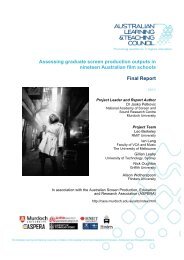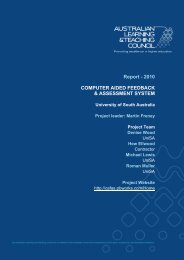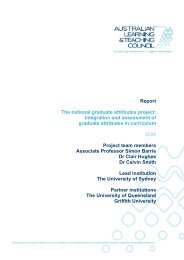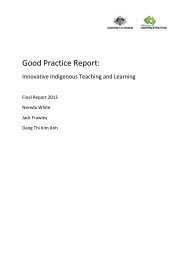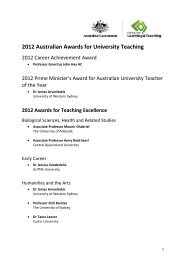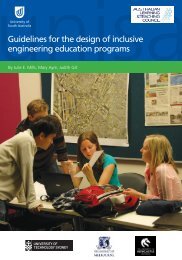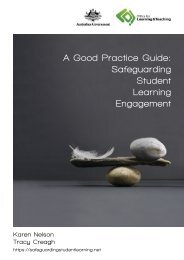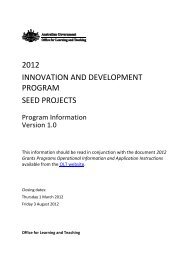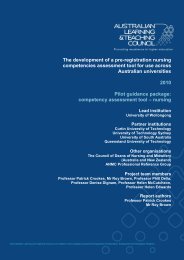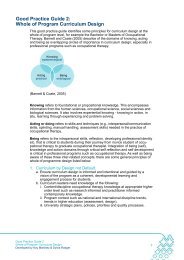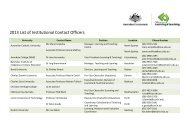national standards for psychological literacy and global citizenship
national standards for psychological literacy and global citizenship
national standards for psychological literacy and global citizenship
Create successful ePaper yourself
Turn your PDF publications into a flip-book with our unique Google optimized e-Paper software.
three issues remain: (a) there is less than full acceptance of the GAs other than knowledge<br />
<strong>and</strong> research, given that the remaining GAs, if assessed appropriately, may have significant<br />
resource implications; (b) a reconsideration is required of the specifics of these GAs/SLOs in<br />
light of the re-examination of the aims of UG psychology education, <strong>and</strong> (c) the<br />
determination of TLOs is required, particularly given the role that APAC may play in the<br />
relationships amongst TEQSA, the HE St<strong>and</strong>ards Panel, <strong>and</strong> the discipline <strong>and</strong> profession of<br />
psychology.<br />
(a) Barriers to Full Acceptance of the GAs<br />
Although some heads of psychology see the value of ensuring that all graduates have, <strong>for</strong><br />
example, good communication skills (beyond report-writing), others appear to take the<br />
st<strong>and</strong> that a teacher-centred focus on knowledge <strong>and</strong> research is the core, <strong>and</strong> anything else<br />
is an unnecessary threat to the success of the department. In the current HE environment<br />
with its emphasis on research reputation, this st<strong>and</strong> is not unrealistic, <strong>and</strong> this needs to be<br />
taken into consideration as Australian psychology education moves <strong>for</strong>ward. In particular, it<br />
may be that the push toward <strong>psychological</strong> <strong>literacy</strong> must first focus on developing the<br />
scientific <strong>literacy</strong> component, to fit best with the current focus of most departmental<br />
programs. Most heads of psychology will find that they need to focus on the employability<br />
component, given the dem<strong>and</strong>s of students <strong>and</strong> education accountability bodies. The <strong>global</strong><br />
<strong>citizenship</strong> component will be viewed as aspirational by most heads; however, again it will<br />
be students, <strong>and</strong> the more <strong>global</strong>ly oriented accountability bodies, that will eventually<br />
encourage heads of psychology to integrate that component into their programs.<br />
(b) Reconsideration of the GAs/SLOs <strong>and</strong> the Structure of the UG Curriculum<br />
During the 2010 APEN Meeting discussions of the GAs <strong>and</strong> associated SLOs, it became clear<br />
that some educators thought that some of the SLOs that were not included in the APAC<br />
St<strong>and</strong>ards should be (e.g., interpersonal communication). Others, however, thought that the<br />
APAC listing was already too prescriptive. In the original delineation of the GAs, it was stated<br />
that these should be revised periodically. Given this, one activity undertaken at the April<br />
2012 Summit was the revision of the SLOs. Since then, a new conceptualisation of the<br />
central role of application in the UG curriculum has been created <strong>and</strong> presented in a Green<br />
Paper (Cranney & Botwood, 2012), including the revised <strong>st<strong>and</strong>ards</strong> document that has been<br />
separately submitted to the APAC St<strong>and</strong>ards Review (see Appendix F). Depending on the<br />
feedback, the paper may be revised <strong>and</strong> resubmitted to the APAC Review.<br />
(c) Minimal Levels of Attainment of the GAs<br />
During the April 2012 Summit, a further activity undertaken by delegates was to attempt to<br />
create <strong>st<strong>and</strong>ards</strong> based assessment statements <strong>for</strong> each edited GA, with reference to the<br />
SLOs. This met with varying success, such that further work is needed be<strong>for</strong>e it can be<br />
determined if this outcome is possible <strong>and</strong> useful. Indeed, the delineation of levels of<br />
achievement may be required by the HE St<strong>and</strong>ards Panel <strong>and</strong> TEQSA, <strong>and</strong> thus may need to<br />
be a central concern of APAC <strong>and</strong> HODSPA. It should be noted that capstone experiences<br />
are considered key instruments <strong>for</strong> allowing students <strong>and</strong> the accountability agencies<br />
(engaged in cross-university benchmarking exercises) to realise the level of attainment of<br />
GAs.<br />
NATIONAL STANDARDS FOR PSYCHOLOGICAL LITERACY AND GLOBAL CITIZENSHIP 9



